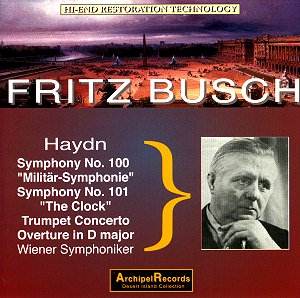Fritz Busch was one of five remarkable sons
of the German instrument-maker Wilhelm Busch. Often confused
with his more famous brother Adolf, the violinist and eventual
father-in-law to Rudolf Serkin, Busch is recognized as one of
the major conductors of the twentieth century. His career was
cut short by a heart attack that claimed his life in 1951.
These are performances
that generate a certain sense of nostalgia for those of us who
began listening to music before the age of period instruments
and historically informed performance practice. There is a certain
grandeur and stateliness about them that is no longer really
acceptable. At the same time, however, they lack the elegance
and grace of more recent recordings.
Some things work
rather well. The “Clock” symphony is rendered at perfectly acceptable
tempi, but the minuet suffers from boots that are too heavy
in which to dance. Additionally, the strings simply play with
too heavy a bow stroke, and as an ensemble, the whole affair
becomes too thick and heavy.
The little overture
is a mere trifle, but at least it is a pleasant one.
Of all the works
on this disc, the trumpet concerto fares the worst. The tempo
choices are too grand for virtuosic displays, and the whole
rendition sounds more like a student effort that that of a major
professional soloist. One need only to hear Wynton Marsalis
play this piece to realize how far we have come since 1950.
Herr Holler displays no special flair for the piece, giving
it a rather run of the mill, phoned in performance, complete
with some pretty serious intonation problems in the slow movement.
The “Military” symphony,
so named for its colorful use of percussion instrument fares
best, and the rollicking finale is actually pretty thrilling.
Archipel boast of
“Hi-end Restoration Technology” but the complete lack of performer
biographies, program notes and commentary on the performances
themselves leave us with a giant “so-what” to their so-called
High-end presentations. This is a project done on the cheap,
with questionable editing in a couple of notable instances.
(Symphony 100’s second movement ends so abruptly that we are
jarred out of our seats.) Sound quality is on the whole acceptable,
although a bit boxy. This one is for die-hard collectors, historical
recording fanatics and followers of this conductor.
Sadly mediocre.
Kevin Sutton

![]() The Vienna Symphony/Fritz
Busch
The Vienna Symphony/Fritz
Busch![]() ARCHIPEL ARPCD 0227
[68:23]
ARCHIPEL ARPCD 0227
[68:23]





